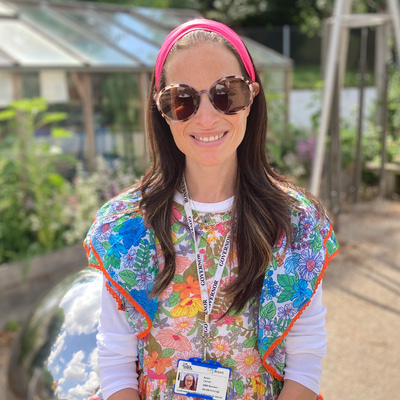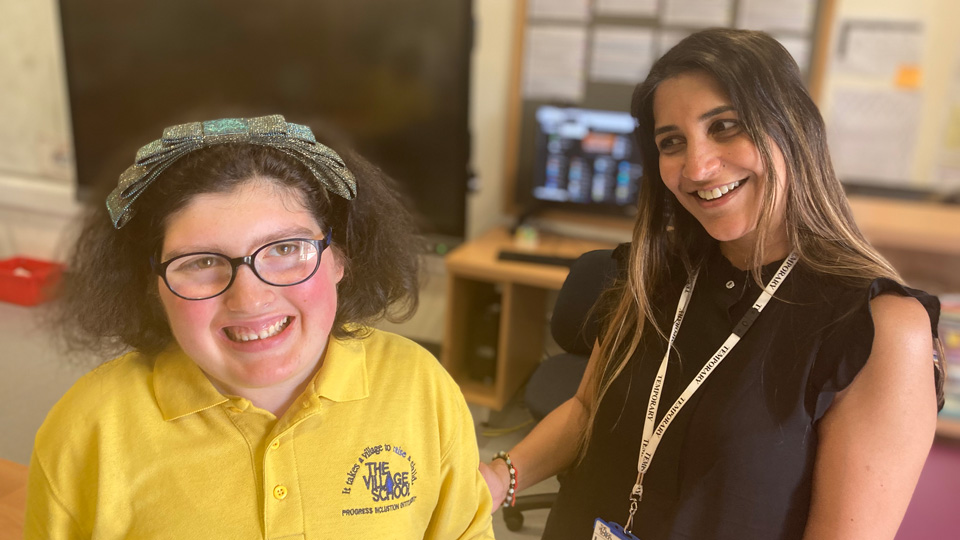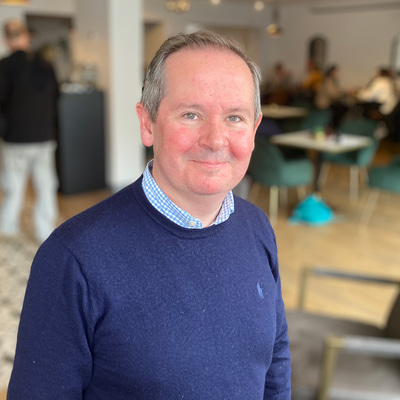- OT
- Professional support
- Health services
- Back to school
In focus
Back to school
OT visits The Village School in Brent to see the NHS Special Schools Eye Care Service in action

27 July 2023
After a morning adjusting and delivering spectacles, Mitch Reuben reaches into his bag, past pliers and screwdrivers, and produces a magician’s hat.
There are a series of moments like this, visiting The Village School in Brent to see the NHS Special Eye Care Service in action, where I expect one thing and see another.
AOP campaign
The AOP has launched its #SightForSEN campaign – promoting the importance of the NHS Special Schools Eye Care Service.
Campaign materials, including a template MP letter to secure the future of the service, are available online.
But if you come to this school expecting a sombre environment, you will be mistaken.
As Reuben walks through the corridors, children smile and wave at him.
In place of standard testing equipment, optometrist Malvi Patel presents a dinosaur toy surrounded by an orbit of coloured lights. Reuben’s young audience know exactly what is going on here.
“It’s magic,” a boy says.
Following months of uncertainty about the future of the NHS Special Schools Eye Care Service, the Government confirmed in June that the service would be rolled out to all special schools from 2024/2025.
At present, the service is currently being offered in more than 80 special schools to close to 11,000 children. Under the changes, 165,000 children could benefit from eye care and spectacles.
The changes address a long-standing gap in eye care provision for this group of children. Research published by SeeAbility in 2019 found that four in 10 children in special schools have no history of eye care.
“There were times when we were doubtful about whether the service would be rolled out,” Reuben shared with OT.
“Then we heard the fantastic news that it is going to be introduced nationwide. I was a bit emotional really, because this is going to make a difference to a lot of children,” he said.
It sounds like it could be a really serious job – and it is important – but it is also joyful
Ayala Lerner is a school governor at The Village School. Her daughter, Gella, 16, started wearing glasses at the age of five.

“She is set on routines – she would never want to miss school or the school bus. She hates going to new places and places that she is not used to,” Lerner emphasised.
“Having everything here in the school is just wonderful. It makes it so much easier,” she said.
Lerner shared that Gella enjoys her visits to SeeAbility, and will bring her spectacles to Reuben when they require repairs.
“She has a slight obsession with her glasses – she keeps on changing them because now she has a second pair,” she said.
“The first thing she does in the morning is put her spectacles on,” Lerner shared.
Lerner shared her excitement for the rollout of the service to other schools.
“I know what it means to me and I can well imagine that many other parents struggle to get eye care for their children,” she emphasised.
The practitioner experience
Rather than trying to get every measurement in a single appointment, if a child’s engagement is fading, optometrists can bring the child back another time.Patel has tested vision in an art room and in a tent – adapting to where the child feels comfortable.
“There have been times clinicians have adjusted spectacles on the trampoline. It is all centred around the child,” Patel shared.
Before working for SeeAbility, Patel worked as a domiciliary optometrist for more than a decade.
She had limited experience working with children with additional needs but felt supported by the level of training in place.

“In my two-decade career of optometry, I have never enjoyed the job as much as this until I started working with SeeAbility,” she said.
Reuben added: “We want optometrists and dispensing opticians to realise that any of you – if you have the will, the passion and the patience – can do this.”
“There are different skills that you need to learn but you get that through experience. It sounds like it could be a really serious job – and it is important – but it is also joyful,” he emphasised.
In a nutshell
The NHS Special Schools Eye Care Service sees pairs of dispensing opticians and optometrists issued with an amended General Ophthalmic Services contract to test the vision of pupils in special schools.
If spectacles are needed, then the child is given a pair of glasses funded by the NHS.
Durable, high-quality frames are featured within the service’s range, including Tomato Glasses, Centrostyle, Miraflex, Erin’s World and Swissflex.
Optometrists and dispensing opticians interested in becoming involved in the Special Schools Eye Care Service can contact [email protected].
SeeAbility clinical lead optometrist, Malvi Patel ([email protected]), and senior dispensing optician, Mitch Reuben ([email protected]), are also happy to answer questions about what is involved.
Martina Babinova, a qualified teacher for children with multi-sensory impairment, has observed the impact of providing eye care at The Village School since SeeAbility first offered a pilot there in 2017.
Babinova shared that wearing spectacles with the correct prescription can transform a child’s behaviour.
“They understand the world around them. That relieves the anxiety – they can see where they are and who is with them,” she said.
Staff make an effort to convey the importance of wearing glasses to the parents of pupils.
Babinova shared the example of a father who said his son did not want to interact with him when sitting on his lap. She explained that his child could not see his face.
“From that moment on, the glasses were always worn. The father burst into tears and said ‘I didn’t know’,” she said.
Having access to eye care and spectacles helps children and young adults take steps towards becoming independent, Babinova shared.
A recently appointed school governor is photographer and former pupil, Dexter McLean – whose work has been displayed at the National Portrait Gallery.
“We want to give children the power to be themselves and find a path forward,” Babinova said.
An immediate tangible effect
Tina Harvey is headteacher at Perseid School – the first school where SeeAbility began offering eye care as part of research in 2013.
“Prior to that the children would need to go to the hospital to get their eyes tested or to the High Street optician. Neither of those really happened,” Harvey shared.
“We wouldn’t know in classes as to whether the child has an eyesight problem or not,” she said.
We want to give children the power to be themselves and find a path forward
Harvey described the positive effect that the NHS Special Schools Eye Care Service has had at her school.
“There was an immediate, tangible difference on access to learning,” she said.
“If you are able to see your world, then you are more likely to be settled, calm and willing to learn,” she highlighted.
Harvey added that some pupils at the school use eye tracking technology to communicate, so it is essential that this is in focus for them.
Siobhain McDonagh has served as Labour MP for Mitcham and Morden for the past 26 years. Perseid School is located within her constituency. McDonagh attends school productions and recently invited Harvey to lunch at the House of Commons after it was announced that she was retiring after 41 years at the school.
When the NHS Special Schools Eye Care Service was first introduced, McDonagh visited Perseid School to see sight tests being carried out.
“I met parents who told me how it was a relief to them – there wasn’t the trouble that there can be about going for a test on the High Street,” she said.
“The optometrists are people with great skill and deal with the children exceptionally well,” McDonagh said.
She shared that the service gives a vulnerable group of children – who are more likely to require spectacles – access to them.
“Every child, whether they have special needs or not, deserves to see and deserves access to a sight test,” McDonagh emphasised.
Conservative MP for Ruislip, Northwood and Pinner, David Simmonds, visited The Eden Academy within his constituency to see first-hand the impact of providing eye care and spectacles to pupils.
“There was a transformational effect. There had been a light bulb moment for teachers where they were struggling with the behaviour of children and they suddenly realised that the problem was that they couldn’t see,” he said.
Before becoming an MP, Simmonds was the lead member for education in Hillingdon Borough for more than two decades.
He shared with OT that every child should be able to participate fully in education.

Head of eye care and vision at SeeAbility, Lisa Donaldson, shared with OT that the NHS Special Schools Eye Care Service has received strong support from the optical sector.
“It has been really heartening to see all of these clinicians come forward and take on these contracts,” she said.
Donaldson shared that before the extension of the service was confirmed, she would regularly receive emails from schools asking if they could access the service.
Beyond the moral case for the service, Donaldson added that expanding it makes economic sense.
“It can cost £30,000 a year to educate a child in a special needs school. They could be sitting in a classroom unable to see for want of a pair of glasses,” she said.
Donaldson frequently receives feedback from parents about the benefits that having eye care in schools brings their children.
“Quite regularly we have parents who are emotional saying ‘You’ve avoided my child having to have a general anaesthetic for their refraction’ or ‘You have discovered that he can’t see on the left and now everyone is approaching from the right it has made such a big difference’,” she said.
Policy public affairs and research manager at SeeAbility, Donna O’Brien, added that even in the face of doubts about the future of the service, her team remained committed to bringing eye care to all children.
“We know now that there are a lot more determined people behind us. There are all of these schools, children, parents and clinicians who know what a difference this service makes,” she said.
Unmet need
- Four in 10 children in special schools have never received eye care
- One in 10 children at special schools have visited an optometry practice for a sight test
- One in three special school pupils need glasses.
Source: SeeAbility
Advertisement


Comments (0)
You must be logged in to join the discussion. Log in